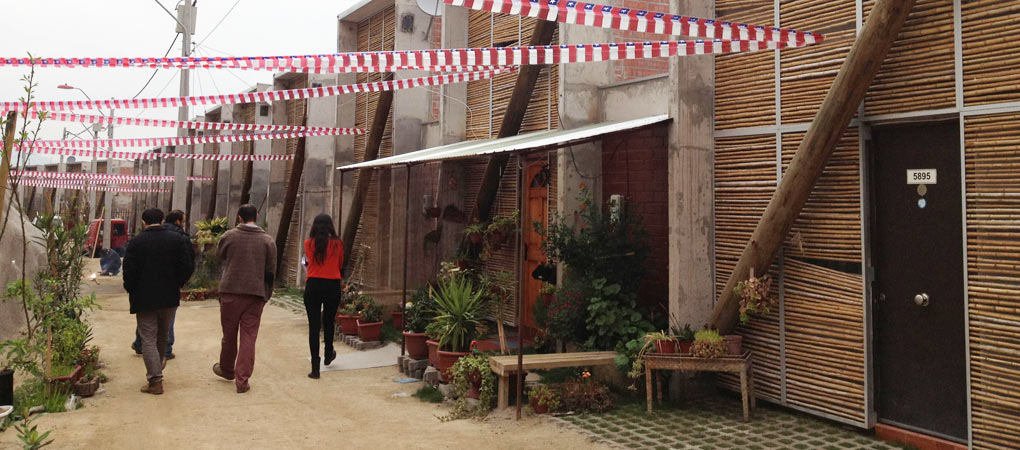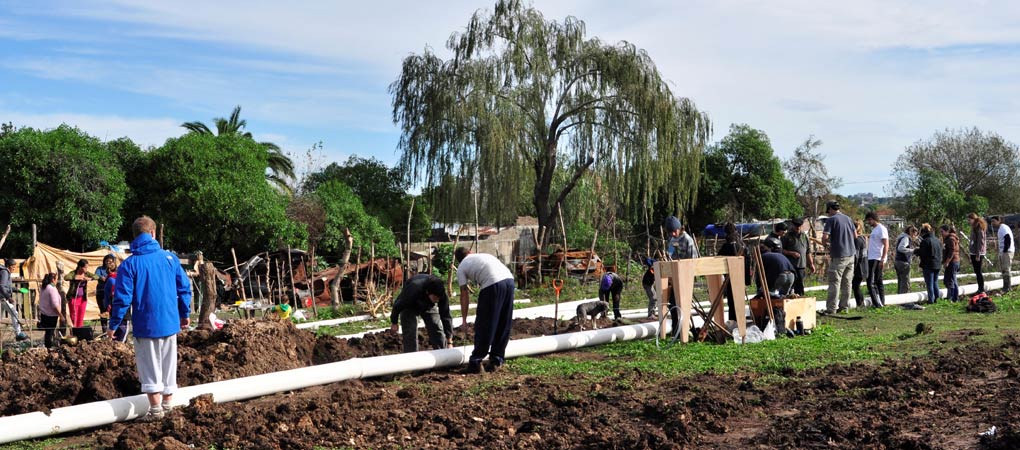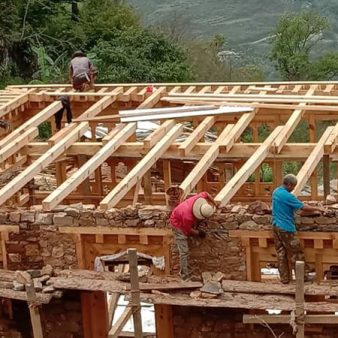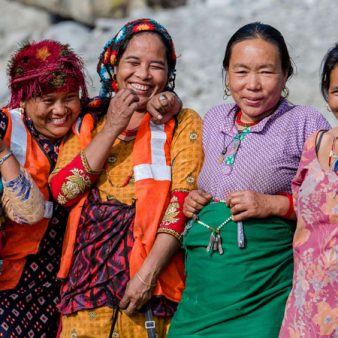TECHO is an NGO working with residents and young volunteers to overcome the poverty in which thousands of people live in informal settlements across Latin America and the Caribbean. TECHO’s ‘Development of Habitat’ projects aim to implement permanent solutions in the settlements in the different countries in which it operates. ‘Development of Habitat’ projects are currently in place in Chile, Argentina, Uruguay and Colombia.
Project Description
Aims and Objectives
TECHO focuses on overcoming poverty in informal settlements. The organisation was started in 1997 by a group of students and soon became a Latin American institution with hundreds of employees and thousands of young volunteers. It works with the families living in informal settlements to develop shared strategies for the improvement and transformation of their communities based on their needs. The programme aims to improve their access to basic services, regularise land use and improvements to their housing wherever the families are. TECHO works to integrate families into the ‘formal city’ so that everyone has the change to develop new skills and exercise their full rights in society.
TECHO operates in 19 countries across Latin America and the Caribbean. The ‘Development of Habitat’ programme focuses on Chile, Argentina, Uruguay and Colombia, having started in Chile in 2006.
Context
UN Habitat estimates that 80 per cent of the population of Latin America lives in cities. Most informal settlements don’t have access to basic services, such as water, sewerage and electricity. Most informal housing is substandard in quality and much of the land where the houses are built is not regularised (i.e. the use of the land has not been agreed with the land owner).
Key Features
To date, the Chile, Argentina and Uruguay programme has reached and helped 23,000 people. Five thousand, nine hundred permanent homes have either been built or redeveloped, land use has been regularised and access to basic services and the urban infrastructure have been improved.
They have achieved this by setting up local design workshops composed of local families, community leaders and volunteers. They work together to identify the needs of the community, to devise practical solutions and plan the improvements.
The programme brings together young volunteers from different disciplines such as architects, lawyers and engineers to evaluate and work on the land in the informal settlements. This enables the groups of volunteers to practise their skills and understand the challenges related to rapid urbanisation. It also helps create crucial social connections between the ‘formal’ and ‘informal’ city.
The programme is supported by a series of partnerships with local government, utility providers, architecture firms, law firms and other institutions. These partnerships are tasked with effectively solving the needs of the communities by obtaining legal land security, accessing basic services and designing improved infrastructure and housing.

What impact has it had?
TECHO’s projects have had a direct impact on the lives of the participating families: besides improved living conditions, people are also trained in management which allows them to lead their own projects and deal with issues.
The project also provides direct experience to the volunteers involved. Young qualified volunteers are recruited and can practise their technical knowledge and improve their skills.
How is it funded?
The programme is funded by a mix of partners from public, private and international development institutions, as well as individual donors. This diversification of funding sources makes the project more sustainable in the long term.
The costs vary by country and type of project. On average the cost per household is US$24,000 (£15,500).
The largest share (60 per cent of income) of the organization’s funding comes from corporate donations while the specific ‘Development of Habitat’ projects are financed at a local level, including with the support of government subsidies.
Why is it innovative?
- TECHO provides a long-term, large-scale answer to improving living conditions in informal settlements.
- TECHO’s approach maintains a long-term relationship with the communities it works in. It aims to fully transform informal settlements into socially and territorially integrated communities.
- TECHO’s approach is far greater than simply improving buildings. It brings together all the key stakeholders who can play a role in upgrading: the families, community organisations, local governments, utility providers, architecture firms, law firms and government.
What is the environmental impact?
- Families are trained on housing maintenance resulting in a more efficient use of energy and water.
- The community has better access to basic services.
- Families in some of the communities in Chile have participated in large scale planting of grass and trees. As the families themselves were involved in planting, these new green areas are looked after and kept clean and tidy by the families themselves.
Is it financially sustainable?
The organisation is financed by a combination of corporate donations (60 per cent), international cooperation funds (20 per cent), individual donors (5 per cent) and conducting various campaigns and fundraising events (15 per cent).
TECHO also has two fundraising offices in the United States (Miami and New York) and two in Europe (UK and Germany).
What is the social impact?
- Apart from helping to deliver high-quality housing and security of tenure, TECHO encourages communities to form relationships between the settlement and external stakeholders. The aim of this is to help transform the settlement into a fully functional neighbourhood.
- TECHO helps to strengthen community leadership to become validated and representative, encouraging self-management and the participation of thousands of residents to generate collective solutions to shared problems.
- TECHO works with young volunteers who work with the families on a daily basis. Thanks to this, strong and long-lasting social connections between the volunteers and the families and communities develop.
TECHO’s Development of Habitat projects address six issues:
- Regularisation of property for the legal security of the land;
- Formalised access to basic services;
- Access to city infrastructure, such as paved streets, public lighting, proximity to public transport, schools and hospitals;
- Living spaces, dimensions and materials, ensuring high technical standards and appropriate common spaces;
- Ensure that the solution is supported with public investment with additional added-value;
- Communities organised based on their collective needs, able to find sustainable solutions to their problems.
Barriers
Time: Projects have an average duration of three to five years. Keeping communities active in a process that does not provide immediate results is not straightforward. This is overcome by letting communities lead the entire process from designing to managing the housing solutions.
Access to land: There has been a shortage of vacant land with the right conditions for the development of the projects. Given this, some projects had difficulties in regularising land.
Lessons Learned
- TECHO found that it is important to accept that regeneration processes are long-term and need constant adaptation.
- The active participation of families in the project, was an essential part of its success.
- TECHO found that efficient implementation depends on many specific requirements that make the project technically feasible, economically viable and socially desirable. Working with all stakeholders to meet these requirements is crucial.
- TECHO found that projects need to be adapted to meet the specific needs of each community.
- The transfer of information and coordination with other actors has been crucial at all stages of the projects.
- A real understanding of the urban and land issues in the areas where the settlements are is essential, as is an understanding of the legal issues relating to the land and a knowledge of the community.
Evaluation
- The technical aspects of the projects delivered by TECHO have been compared with projects from other institutions.
- All the ‘Development of Habitat’ projects are undertaken by a multidisciplinary team from TECHO (architects, lawyers etc.) who plan and deliver all the processes and stages in the projects.
Transfer
TECHO’s model, first established in Chile, has been replicated and improved through ongoing learning across Latin America. The transfer of the ‘Development of Habitat’ programme involves the experience and learning from the development work in the originating country. To implement it in another country it’s vital to adapt the project to the local situation and within the opportunities provided by the political and social context.
It is now being replicated in three other countries:
- Argentina (in Buenos Aires and Córdoba since 2012 and Salta and Río Cuarto since 2014)
- Uruguay (in Montevideo) since 2012
- Colombia (in Bogota) since 2015
Two professionals working in Chile for the last three years moved to live in Argentina and Uruguay in 2012. This was the first time transfer of the programme occurred to other countries and cities in Latin America.
Initially they formed teams with local volunteers to gather information within informal settlements with the aim of planning the local work. Currently this work of transferring the experience to the other countries in which TECHO works continues.



